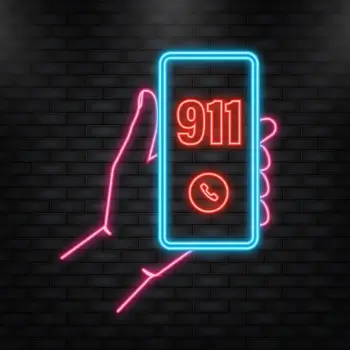What Is Swatting and How Do I Prevent It?
Imagine you're streaming Call of Duty online with your friends when suddenly, your channel is reported by viewers alleging a fake emergency at your residence. They contact authorities and a SWAT team shows up at your home, potentially harming you or your property. Unfortunately, this is the reality of swatting - a dangerous scam that has grown increasingly more common. In this article, we'll delve into the dark world of swatting, its alarming impact on victims, and the efforts you can make to prevent swatting.
What is swatting?
Swatting is a form of cyber harassment in which an attacker makes a false report to law enforcement - often a SWAT team - in order to startle, intimidate, or arrest an unsuspecting victim. This illegal prank is often pulled on gamers and live streamers with the intention of causing chaos on their livestream.
You "swat" someone when you contact emergency lines like 911 and falsely report a violent situation, bomb threat, hostage situation, or other criminal incident in their home. The perpetrators call armed police to a victim's house without them knowing.
For the crime to work, swatters must deceive the police department into believing that a serious crime is taking place at the location of the targeted gamer. This results in a potentially deadly response from law enforcement. Though swatters may intend for it to be a prank, swatting can result in serious consequences like injury or property damage.

Some countries consider swatting a serious crime. It has evolved beyond a prank to become a legitimate cyber threat, much like doxxing or DDoS attacks. Some authorities even categorize it as domestic terrorism, as some swatting incidents attempt to target politicians, journalists, or activists for politically motivated reasons.
How do swatters find their victims?
In order to carry out a swatting prank, swatters need to know the victim's home address. There are a few ways in which perpetrators can identify the location of a targeted person.
- IP address - Every device connected to the Internet has a unique IP address. IP addresses can determine someone's general location. Swatters can obtain your IP address by hacking into your device via online communication. Then, once they have your IP, they can use publicly-available IP geolocation services to determine your general location.
- Doxxing - If you've ever been doxxed online, someone seeking to swat you can use that information to locate you and carry out their attack.
- Location services - Many Internet-connected devices have location services that turn on by default. Some hackers are able to access this location data via third-party apps.
- Information online - What you post online or on social media matters. Attackers can use information you've put on online forums or social networks to track you down.
- Phishing scams - Attackers can use any kind of phishing scam, from fake emails to targeted texts, to manipulate victims into turning over important information.
Make sure that you limit the amount of information you put online. Furthermore, check your device and app settings to protect your privacy.
Is swatting deadly?
Yes. Swatting is a hoax that is, at worst, criminal and dangerous; at worst, it's deadly. It wastes the valuable resources of first responders and puts victims in psychological and physical danger. There are several documented cases of swatting deaths. In these cases, swatting led to injury or death for either victims, first responders, or perpetrators.
- Andrew Finch (2017) - Triggered by an online gaming dispute, a swatter made a false report to the home of Andrew Finch in Wichita, Kansas. Wichita Police responded to the incident and ended up shooting and killing Finch, who had committed no crimes.
- Louis Ross (2015) - A homeowner shot Sentinel Police Chief Louis Ross in a swatting incident after the police received reports of a shooting at Ross' residence. When Ross came outside to investigate, he shot at Chief Louis Ross. The officer sustained injuries, but lived.
- Douglas Dendinger (2014) - A swatter named Ronald Gotlin called the police in New Jersey, claiming there was a domestic violence situation at Dendinger's house. There wasn't, but when the police stormed Dendinger's home, he suffered a heart attack and later died. Gotlin received 30 years in prison.
Consequences of swatting
In addition to the injury or even death that can occur when a SWAT team or police force enters a person's home under false pretenses, there are other consequences of swatting, both for the victim and the perpetrator.
Even if no death or injury happens, this crime causes significant emotional and psychological trauma for victims and their families. Furthermore, swatting reaps legal consequences. Swatting is a serious crime, and if the perpetrator is found, they will be fined or face jail time. It also creates a financial cost for victims.
Swatting takes legitimate law enforcement resources and squanders them on a false report. It harms everyone involved. First responders waste time and resources responding to the call, and it diverts attention away from actual emergencies, putting other lives at risk.
Without a doubt, swatting is dangerous. It not only endangers those directly involved, but also the reputations of online communities and law enforcement officers. It negatively impacts the lives of those targeted and those who respond.
For obvious reasons, all users should try to prevent swatting. They should do what they can to protect themselves against attacks.
How to prevent swatting
You can take several precautions to avoid becoming the victim of a swatting attack.
- Limit the amount of information you post online. By keeping your personal information private, you make it significantly harder for an attacker to track you down. Be mindful of what you share online or on social media, especially when it comes to your location, phone number, and real name.
- Use a VPN or proxy. One of the best ways to protect yourself against swatting is by using a VPN or proxy. These services allow you to hide your IP address, making it difficult for malicious actors to identify your true location. VPNs and proxies also encrypt your Internet traffic, which keeps hackers from intercepting your data.
- Avoid geotagging posts. Geotagging lets social media platforms track your location and tag your post with your coordinates. Disabling this feature prevents swatters from using this data to locate you.
- Never use real names for game usernames. Since most swatting attacks come from the online gaming community, use a game username that does not attach to your real identity in any way.
- Optimize your privacy settings. Make sure to change your privacy settings on your online accounts to limit the amount of information shared publicly.
If you think you might be targeted for a swatting attack, contact the necessary authorities and block who you believe to be the offender as soon as possible.
Frequently asked questions
What does SWAT stand for?

SWAT stands for Special Weapons and Tactics. It's a specialized unit within law enforcement agencies typically tasked with handling high-risk situations like hostage rescue, high-risk warrants, and counter-terrorism operations. The term is used here because SWAT teams are often sent to respond to swatting events, thus giving "swatting" its colloquial meaning.
Can people swat me?
Yes, swatters can target anyone. Though it's unlikely you'll be targeted if you don't have much of an online presence, it's still best to take steps towards protecting your personal information online. If you suspect someone is targeting you for swatting, call the appropriate authorities immediately.
Does a VPN help prevent swatting?
Yes. A VPN helps protect your privacy online. It will hide your exact location by changing your IP address, limiting how swatters can identify your home address.
What are some warning signs that someone may be planning a swatting incident?
Though you can't always tell when someone is attempting to swat you, some signs include receiving threatening messages or phone calls, finding personal information posted online without your consent, and being involved in online conflicts.